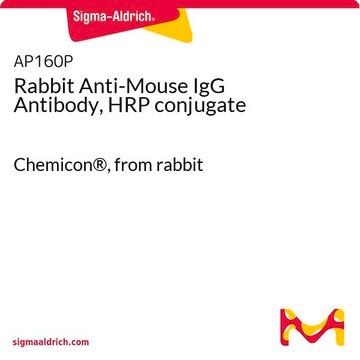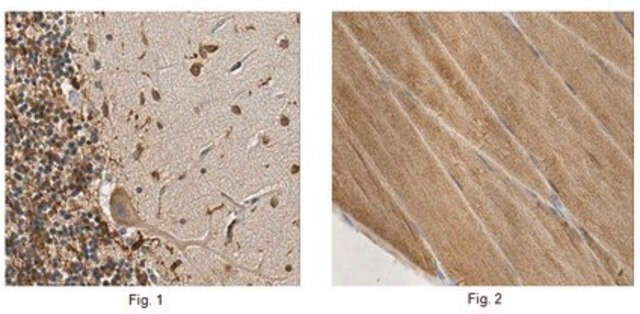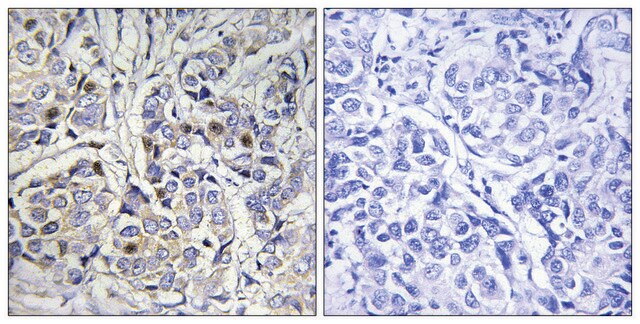04-298
Anti-IGF1 Receptor (CT) Antibody, clone 7G11
clone 7G11, Upstate®, from mouse
Synonym(s):
insulin-like growth factor 1
Sign Into View Organizational & Contract Pricing
All Photos(1)
About This Item
UNSPSC Code:
12352203
eCl@ss:
32160702
NACRES:
NA.41
Recommended Products
biological source
mouse
Quality Level
antibody form
purified antibody
antibody product type
primary antibodies
clone
7G11, monoclonal
species reactivity
human
manufacturer/tradename
Upstate®
technique(s)
ELISA: suitable
western blot: suitable
isotype
IgG1
UniProt accession no.
shipped in
wet ice
target post-translational modification
unmodified
Gene Information
human ... IGF1(3479)
Specificity
Recognizes C-terminus of IGF1 receptor
Immunogen
KLH-conjugated synthetic peptide encompassing the surrounding amino acids of the C-terminus in human IGF1
Application
Anti-IGF1 Receptor (C-terminus) Antibody, clone 7G11 detects level of IGF1 Receptor (C-terminus) & has been published & validated for use in ELISA & WB.
Research Category
Signaling
Signaling
Research Sub Category
Insulin/Energy Signaling
Insulin/Energy Signaling
Quality
Routinely evaluated by immunoblot.
Target description
90 kDa
Physical form
100 &mciro;g of purified mouse monoclonal IgG lyophilized in 2X PBS containing 0.09% sodium azide, PEG, and sucrose
Format: Purified
Subsequent thiophilic adsorption and size exclusion chromatography
Storage and Stability
2 years at -20°C from date of shipment. Reconstitute prior to use. Reconstitute with 1 mL H2O for 15 min at room temperature. Reconstituted aliquots should be stored frozen at -80°C. Thawed aliquots may be stored at 4°C for up to 3 months. Avoid repeated freeze/thaw cycles, which may damage IgG and affect product performance.
Analysis Note
Control
Includes untreated A431 lysate as a positive control.
Includes untreated A431 lysate as a positive control.
Legal Information
UPSTATE is a registered trademark of Merck KGaA, Darmstadt, Germany
Disclaimer
Unless otherwise stated in our catalog or other company documentation accompanying the product(s), our products are intended for research use only and are not to be used for any other purpose, which includes but is not limited to, unauthorized commercial uses, in vitro diagnostic uses, ex vivo or in vivo therapeutic uses or any type of consumption or application to humans or animals.
Not finding the right product?
Try our Product Selector Tool.
Storage Class Code
10 - Combustible liquids
Certificates of Analysis (COA)
Search for Certificates of Analysis (COA) by entering the products Lot/Batch Number. Lot and Batch Numbers can be found on a product’s label following the words ‘Lot’ or ‘Batch’.
Already Own This Product?
Find documentation for the products that you have recently purchased in the Document Library.
Thomas Thum et al.
Circulation research, 100(3), 434-443 (2007-01-20)
Aging is associated with an increased risk for atherosclerosis. A possible cause is low numbers and dysfunction of endothelial progenitor cells (EPC) which insufficiently repair damaged vascular walls. We hypothesized that decreased levels of insulin-like growth factor-1 (IGF-1) during age
M Wallander et al.
Diabetologia, 49(10), 2247-2255 (2006-09-07)
Low levels of IGF-I are associated with increased risk of cardiovascular disease and type 2 diabetes. The aim of this study was to investigate the IGF-I system in patients with acute myocardial infarction (AMI) without previously known diabetes. One hundred
Marcus H Borges et al.
Biochimica et biophysica acta. Molecular basis of disease, 1865(9), 2411-2419 (2019-06-09)
We have previously described regulation of syncytial GLUT1 glucose transporters by IGF-I. Despite this, it is not clear what signal regulates transplacental glucose transport. In this report we asked whether changes in GLUT1 expression and glucose transport activity in diabetic
Shuhua Chen et al.
Neurotherapeutics : the journal of the American Society for Experimental NeuroTherapeutics, 17(4), 1813-1824 (2020-07-08)
Previous studies demonstrated that the endogenous neurosteroid allopregnanolone (Allo) promotes regeneration of rodent and human neural progenitor/neural stem cells (NSCs) in vitro and in vivo, and restores neurogenesis and cognitive function in the male triple transgenic mouse model of Alzheimer's
null
Our team of scientists has experience in all areas of research including Life Science, Material Science, Chemical Synthesis, Chromatography, Analytical and many others.
Contact Technical Service







